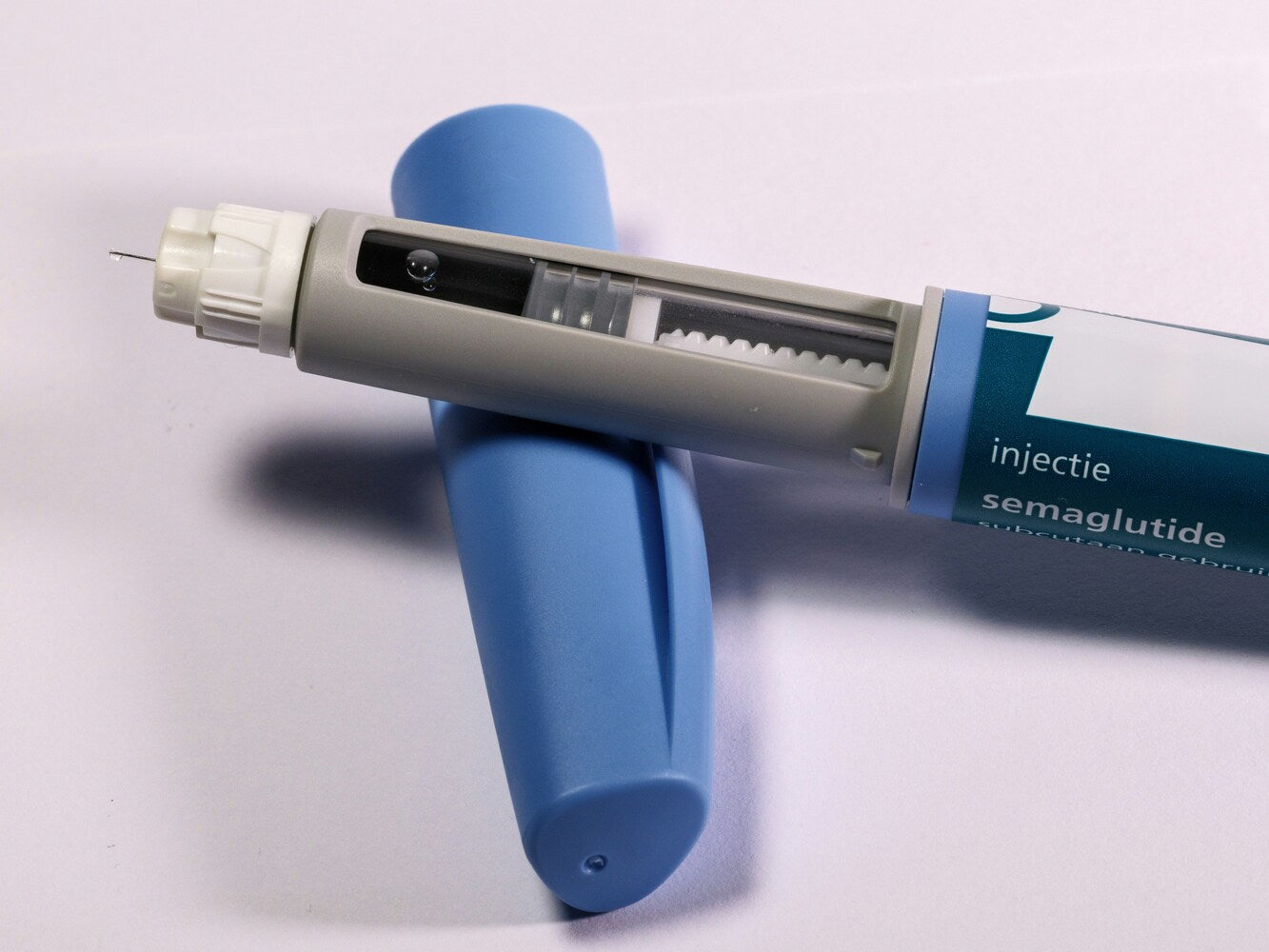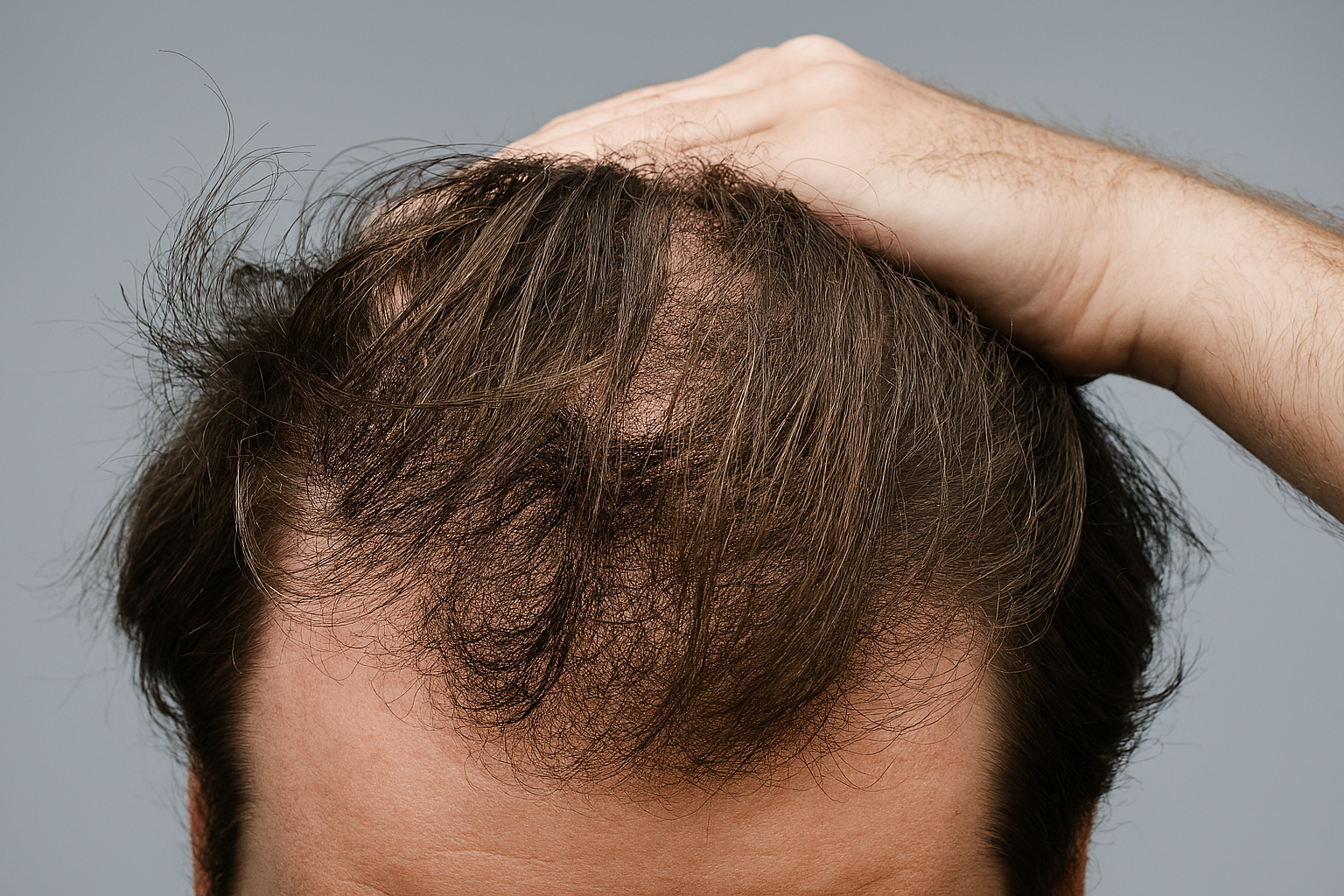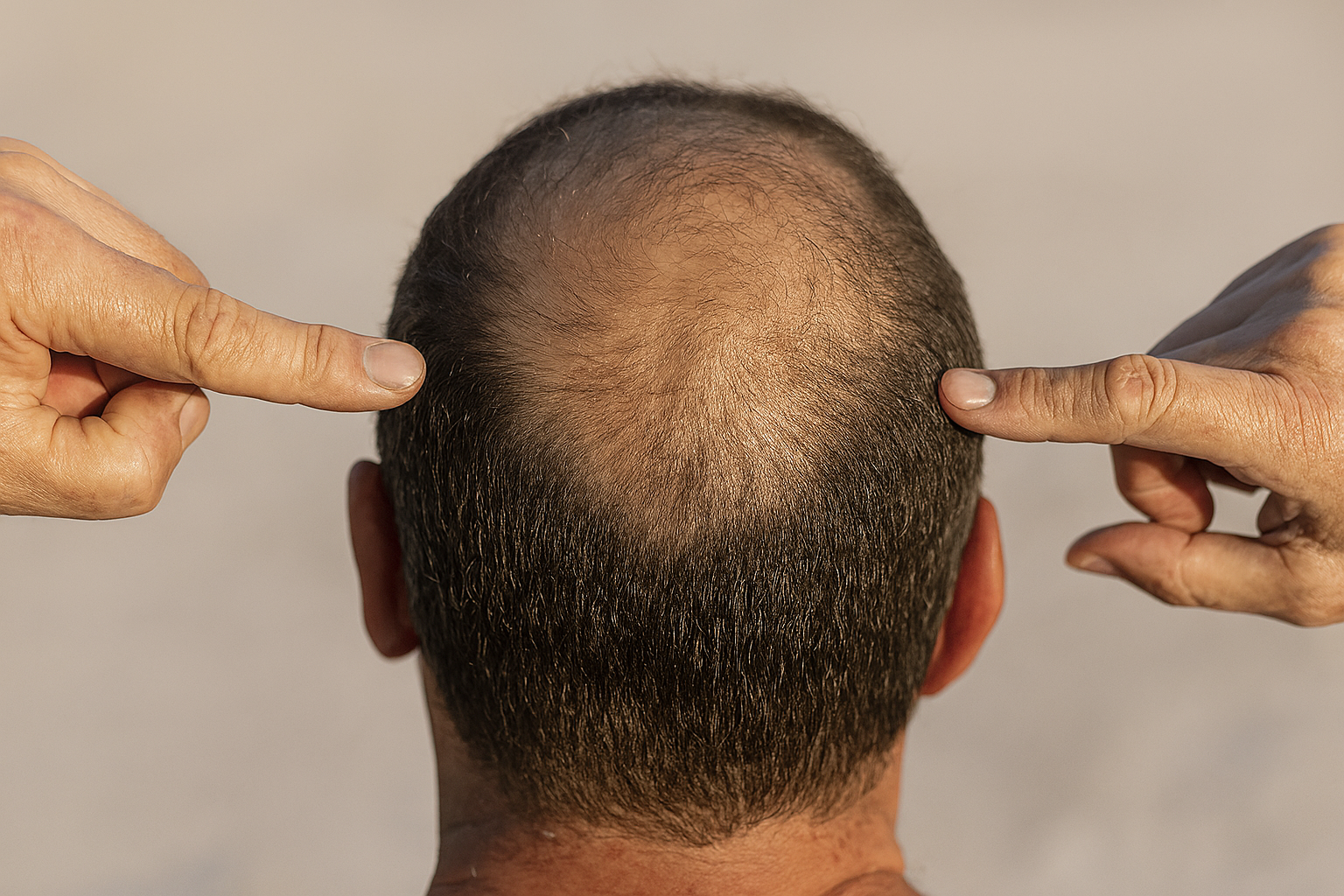You finally found something that works. The weight is coming off, your appetite is under control, and for once, you're seeing real results. But now, something else is happening—your hair is starting to thin out. You're noticing more shedding in the shower, more strands on your pillow, and a growing sense of concern. Is Ozempic behind it?
Ozempic, also known by its generic name semaglutide, has quickly become one of the most talked-about medications on the market. Originally formulated to manage Type 2 diabetes, it's now widely prescribed off-label for weight loss, and it's changed the game for countless people.
But along with the excitement has come a surprising new concern. More and more men are speaking up about unexpected hair loss after starting Ozempic, raising the question: Does Ozempic cause hair loss?
If you're noticing hair loss while using Ozempic, don't panic - let's break down what's really happening and how you can take control.
What Is Ozempic and Why Is It So Popular?
Ozempic is the brand name for semaglutide, a medication that belongs to a class of drugs called GLP-1 receptor agonists. GLP-1 stands for glucagon-like peptide-1, which is a naturally occurring hormone your body releases after eating. It helps regulate blood sugar, insulin production, and appetite.
Ozempic was originally developed and approved by the FDA to treat Type 2 diabetes. It works by mimicking GLP-1, which slows down digestion, improves insulin response, and helps lower blood glucose levels. But there's another effect that caught everyone's attention: weight loss.
Because Ozempic also helps reduce hunger and increase feelings of fullness, doctors began prescribing it off-label (meaning for a purpose not officially approved) for weight management. That's when things really took off. Social media, celebrity endorsements, and real-world success stories pushed Ozempic into the spotlight, and demand skyrocketed.
As a result, similar GLP-1 medications, such as Wegovy and Mounjaro, have also gained popularity. Here's a quick breakdown:
-
Wegovy: Also contains semaglutide, but is specifically FDA-approved for chronic weight management in people with obesity or weight-related health conditions.
-
Mounjaro: Contains tirzepatide, another GLP-1 agonist that targets both GLP-1 and GIP receptors, making it effective for both blood sugar control and weight loss.
So, whether you're taking Ozempic for diabetes or weight loss, you're using a powerful hormone-mimicking medication that has systemic effects on your metabolism, appetite, and, in some cases, even your hair.
Let's explore how that connection between Ozempic and hair loss might work.
Can Ozempic Cause Hair Loss?
Short answer: Not directly.
Hair loss is not listed as a known or common side effect of Ozempic. However, thousands of users report noticing thinning or excessive shedding after starting the medication.
Here's why that might be happening anyway:
Rapid Weight Loss Can Disrupt Hair Growth
When your body undergoes a sudden calorie drop or fast weight loss, it can trigger a condition called telogen effluvium. This causes more hair follicles than usual to enter the resting phase (telogen), resulting in visible shedding.
Semaglutide drugs like Ozempic work by suppressing appetite, often leading to quick fat loss, which can stress your system, even if you're not crash dieting.
Think of it this way: Your body registers rapid weight loss as a survival threat. It redirects energy away from non-essential functions, such as hair growth, to keep you going.
Nutritional Deficiencies Play a Role
Less food usually means fewer nutrients, and that's bad news for your hair. When your body isn't getting the fuel it needs, it begins to prioritize vital functions, such as organ health and metabolism. Unfortunately, hair growth isn't at the top of the list, so it often takes the hit first.
Hair health relies heavily on consistent intake of key nutrients like:
-
Proteins: These are the building blocks of keratin, your hair's main structural protein. Low protein intake can lead to weaker, more brittle strands.
-
Iron: It is essential for oxygenating hair follicles. Iron deficiency is one of the most common causes of hair loss in men.
-
Biotin (Vitamin B7): It plays a major role in producing keratin and maintaining hair strength and shine.
-
Zinc: It supports follicle function and helps regulate oil glands around the hair shaft.
-
Vitamin D: It helps stimulate old and new hair follicles, especially important in men with thinning at the crown.
If you're not meeting your daily nutritional needs, especially with smaller portion sizes, appetite loss, or nausea (common with semaglutide), your hair may begin to thin or shed more rapidly. Over time, this deficiency-induced stress can push more follicles into the telogen (resting) phase, slowing new growth and leading to visible hair thinning.
Hormonal and Medication-Induced Stress
While not fully understood, GLP-1 receptor agonists like Ozempic may indirectly affect hormone regulation, especially in men with existing sensitivities. These medications can influence metabolic pathways closely linked to hormones such as thyroid hormones, testosterone, and DHT (dihydrotestosterone), all of which play a role in the hair growth cycle.
Even minor hormonal shifts can lead to noticeable shedding. For example, low thyroid function is a known cause of thinning, and changes in testosterone or DHT levels can worsen male pattern hair loss.
So while Ozempic isn't directly altering hormones, its impact on your body's overall balance might indirectly contribute to temporary or pattern-related hair loss in some users.
What Do the Experts Say?
Let's look at what trusted sources are reporting.
|
Source |
Key Takeaway |
|
Misuse of Ozempic for extreme, rapid weight loss may trigger significant, potentially long-term hair loss. |
|
|
Hair loss isn't caused by Ozempic itself, but can be a side effect of sudden weight loss or stress on the body. |
|
|
Points to telogen effluvium as the likely culprit, usually temporary. |
|
|
Notes the common timing of hair shedding (2 to 3 months into use), aligning with typical stress-induced hair loss patterns. |
So, while Ozempic isn't the direct villain, it might be setting the stage.
Is the Hair Loss Permanent?
Here's the good news: No, in most cases, it's not permanent.
Once your body adjusts or the original trigger (like rapid weight loss or a deficiency) is resolved, hair tends to grow back over the next 3 to 6 months.
But it's important to be patient. Hair cycles take time, and regrowth won't happen overnight.
Signs Your Hair Loss Might Be Linked to Ozempic (Indirectly)
Wondering if your hair shedding could be connected to Ozempic? You're not alone. While hair loss isn't listed as a direct side effect, many users report noticeable changes a few weeks or months into their weight loss journey.
Here are some common signs that your hair loss might be indirectly related to semaglutide use:
-
You started losing hair 2 to 3 months after beginning Ozempic or after a period of rapid weight loss
-
You've seen more hair in the shower drain, on your pillow, or in your brush than usual
-
The hair seems to be falling out diffusely, not in patches
-
There's no itching, burning, redness, or visible scarring on your scalp
-
Your scalp still looks healthy, and you don't feel any pain or irritation
These signs are consistent with telogen effluvium, a temporary condition in which stress, illness, or significant body changes (such as rapid weight loss) cause hair follicles to shift into a resting phase. It's very different from autoimmune-related hair loss, such as alopecia areata, which typically causes bald patches and may involve inflammation or tingling. If your shedding lines up with the timeline of starting Ozempic or losing weight quickly, it's likely a reaction to the physical stress your body is under, not a sign of permanent hair damage.
How to Prevent or Manage Hair Loss While on Ozempic
While you might not be able to stop all hair loss immediately, you can absolutely minimize it and support regrowth with the right steps.
Eat Smart
What you eat has a direct impact on the health of your hair, especially when you're on a medication like Ozempic that can suppress appetite. Prioritizing nutrient-dense foods is key. Your hair is made of protein, so getting enough from sources like eggs, lean meats, and legumes can help maintain strength and thickness.
Iron is just as important; without it, your hair follicles don't get the oxygen they need to grow. Think spinach, red meat, and lentils. And don't forget essential vitamins and minerals, like zinc, biotin, and vitamin D, all play major roles in hair health and should be kept in balance.
Avoid Extreme Dieting
While Ozempic already helps reduce calorie intake, going too far with food restriction can backfire, especially for your hair. Your body views extreme dieting as a stressor and begins conserving energy for essential functions, meaning hair growth often takes a hit. When your system is under stress from rapid weight loss or nutrient shortages, it can trigger telogen effluvium, a type of temporary hair shedding.
Even if the scale is moving quickly, slow and steady wins the race when it comes to long-term health. Make sure your diet supports your body's needs so your hair isn't the one paying the price.
Gentle Hair Care
Hair that's already stressed from internal factors, such as weight loss or hormonal changes, needs extra care on the outside too. Choosing gentle, sulfate-free shampoos can help avoid stripping your scalp of its natural oils, which are crucial for healthy growth. Heat styling tools, such as blow dryers and flat irons, may give you a quick, polished look, but excessive heat can weaken the hair shaft over time.
Similarly, tight hairstyles or rough brushing can cause breakage and add to shedding. Keeping your hair routine low-stress and supportive can go a long way in maintaining fullness while your body adjusts to Ozempic.
Support Healthy Growth with Spartan
At Spartan, we've developed doctor-formulated solutions specifically for men navigating hair loss - whether it's due to weight loss, aging, or stress.
Our range of products for hair health includes:
-
Root Activator Shampoo: This plant-powered formula is designed to protect and stimulate hair follicles, promoting healthy hair growth.
-
Root Activator Conditioner: Engineered to nourish the scalp and strands, this patented formula delivers hydration and strengthens hair roots.
-
Root Activator Soap Bar: A gentle, natural cleansing option, this soap bar works to detoxify the scalp, helping remove buildup while supporting hair roots.
-
Root Activator Spray: A leave-in nutrient-packed spray that infuses the roots with components like citric acid, ginger oil, and vitamin B5, aimed at supercharging
When to Talk to a Doctor
Hair loss can be frustrating, but don't wait it out blindly. See a healthcare provider if:
-
Shedding is severe or lasts more than 6 months: Occasional shedding is normal, especially during times of stress or change, but prolonged or heavy hair loss may signal an underlying issue. A doctor can run tests to determine if it's linked to medication, nutrient deficiencies, or something more serious.
-
You notice bald patches, scalp pain, or redness: These symptoms may indicate a condition other than temporary shedding, such as alopecia areata, scalp psoriasis, or a fungal infection. Early intervention can help prevent permanent follicle damage and support regrowth.
-
You're unsure whether it's from Ozempic or another issue (e.g., thyroid, autoimmune): Hair loss can have multiple causes, and it's not always easy to tell what's behind it. A medical professional can review your medications, order bloodwork, and evaluate your overall health to pinpoint the root of the problem.
Final Thoughts
So, does Ozempic cause hair loss? In a nutshell, not directly. But if you're losing weight fast, skipping meals, or stressing your body out, your hair may feel it too.
The silver lining? It's almost always temporary, and you can take steps to get ahead of it.
Looking to strengthen your hair from the inside out? Discover our complete line of hair loss solutions designed specifically for men. Take back control of your hair health with Spartan - starting today.



